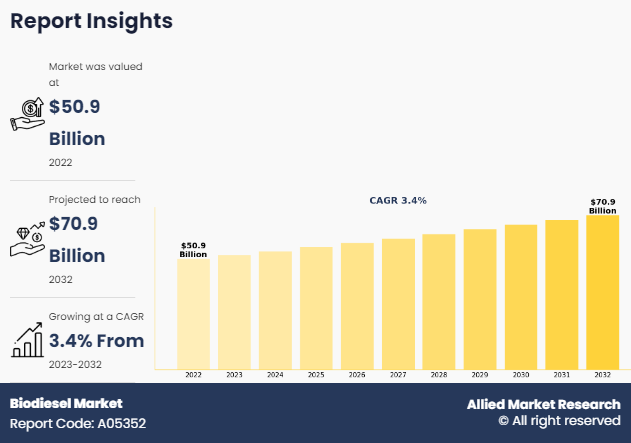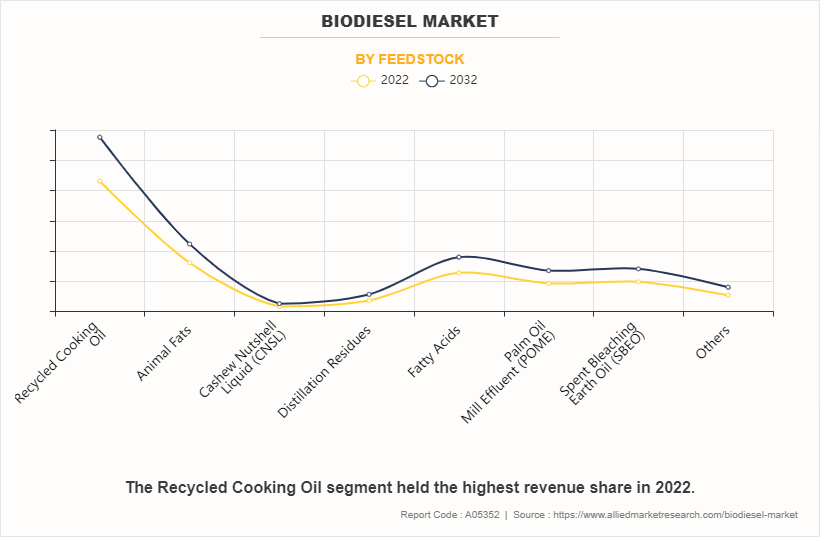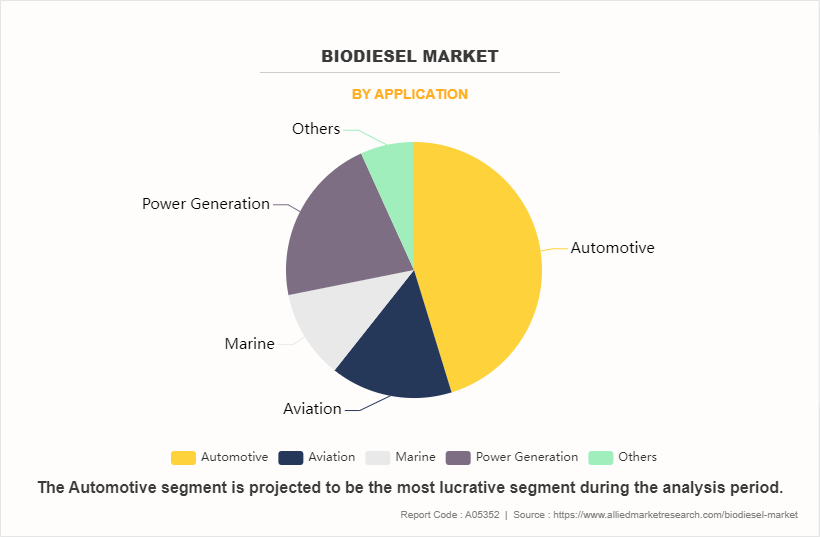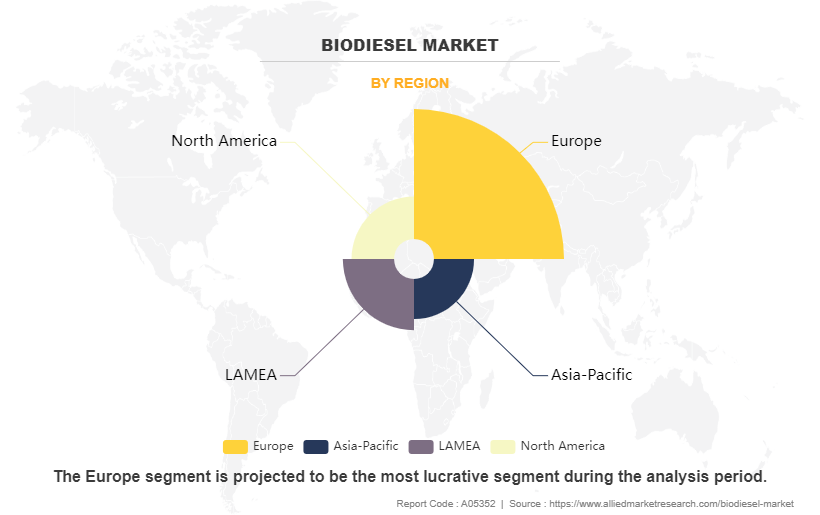Biodiesel Market Research, 2032
The global biodiesel market was valued at $50.9 billion in 2022, and is projected to reach $70.9 billion by 2032, growing at a CAGR of 3.4% from 2023 to 2032. Biodiesel is a sustainable biofuel used to power vehicles to reduce the carbon footprint from the transportation sector. Government institutions such as the Environmental Protection Agency have set various regulations for the application of biofuels.

Introduction
Biodiesel also known as biofuel can be produced from plant sources such as algae, waste oils, palm oil, and camelina; from solid biomass using a chemical process called transesterification which converts natural fats and oils into fatty acid methyl esters or biodiesel. High-quality biodiesel is produced from rapeseed, however, most of the biodiesel is produced from waste vegetable oils obtained from chip shops, restaurants, and industrial food producers.
Key Takeaways
The biodiesel market is highly fragmented, with several players including Cargill Incorporated, Eni S.p.A., Bunge, Kolmar, Ital Bi Oil S.R.L., Bp Oil International Ltd., Tamoil Italia S.P.A., Italiana Petroli S.P.A., Esso Italiana S.R.L., Masol Continental Biofuel Srl, and Saras S.P.A.
More than 6,765 product literatures, industry releases, annual reports, and other such documents of major biodiesel industry participants along with authentic biodiesel market news journals, trade associations' releases, and government websites have been reviewed for generating high-value industry insights.
- The study covers value and volume during the forecast period 2022-2032 is covered in the biodiesel market report.
Market Dynamics
The cost of biodiesel production in Europe exhibits significant variability, influenced by factors such as raw materials, production scale, and geographical location. Notably, biodiesel prices experienced a notable drop in the European market, reaching USD 2583/ton FD Hamburg in April during the second quarter of 2023. According to the International Energy Agency (IEA), biodiesel prices in Europe have displayed fluctuations over the years. In addition, biodiesel production costs vary across different feedstocks, with estimated costs ranging from $0.53 to $11.13 per gallon for palm oil, soybean oil, and algae, depending on specific production circumstances. It is crucial to acknowledge that the cost of biodiesel production generally surpasses that of conventional diesel, with a differential of about 25 to 27 cents per liter, factoring in a 6% increase in fuel consumption with biodiesel. However, ongoing investments in research and development, along with increased experience in commercial-scale projects, hold the potential to mitigate these costs in the future. In summary, despite the current cost differentials, ongoing advancements in the biodiesel industry are anticipated to contribute to cost reduction, making biodiesel an increasingly viable and environmentally beneficial alternative to conventional fuels in Europe. It is crucial to note that these costs are subject to fluctuations influenced by raw material prices, technological advancements, and other dynamic factors. These insights underscore the multifaceted nature of biodiesel production economics and the need for adaptability within the industry.
The future of biodiesel holds promising prospects as it is poised to play a significant role in the global energy landscape. The anticipated increase in global biofuel demand, particularly driven by higher blending targets in developing countries, signals a positive trajectory for biodiesel. Governments worldwide are actively supporting biofuels through strategic policies, exemplified by initiatives like India's National Bioenergy Programme, which is set to continue until 2025‐“2026.
Biodiesel's potential contribution to reducing air pollution, carbon emissions, and dependence on fossil fuels aligns with broader environmental goals. However, the industry faces challenges, including conversion efficiency and yield issues, impacting commercial feasibility and competitiveness. The ongoing pursuit of innovative process intensification alternatives aims to address these challenges and enhance biodiesel's viability. It's important to note that the realization of these projections depends on various factors, including technological advancements, policy changes, and market dynamics. As the biofuel landscape evolves, these dynamic influences are expected to shape biodiesel's role in the energy mix.
Biodiesel stands out as a versatile and accessible alternative fuel for diesel engines, offering compatibility with minimal or no modifications required for existing diesel vehicles. This adaptability is a key advantage, allowing biodiesel to be seamlessly integrated into conventional diesel engines without compromising performance. The flexibility extends to blending ratios, with biodiesel capable of being mixed with diesel fuel in any proportion or used as a pure fuel (B100). Common blends like B20 (6% to 20% biodiesel) and B5 (5% biodiesel, 95% diesel) are widely used in fleet vehicles without necessitating engine modifications. However, biodiesel's higher viscosity poses challenges to fuel filters and injectors, as well as potential issues in cold temperatures. While a standard diesel engine runs on pure biodiesel with modifications, it's advisable to consult engine manufacturers' guidelines to ensure compatibility and warranty compliance.
Segments Overview
The biodiesel market is segmented into feedstock, application, and country. By feedstock, the market is divided into recycled cooking oil, animal fats, cashew nutshell liquid (CNSL), distillation residues, fatty acids, palm oil mill effluent (POME), spent bleaching earth oil (SBEO), and others. By application, it is segregated into automotive, aviation, marine, power generation, and others. On the basis of region, the market is analyzed across North America, Europe, Asia-Pacific, and LAMEA.

On the basis of feedstock, the recycled cooking oil segment held the highest market share in 2022, accounting for more than two-fifths of themarket r evenue, and is estimated to maintain its leadership status throughout the biodiesel market forecast period. The global push for renewable energy sources and the circular agriculture paradigm offer opportunities for market expansion. As investments grow, the biodiesel market is poised to capitalize on recycled cooking oil for environmental and economic benefits.

On the basis of application, the automotive segment held the highest market share in 2022, accounting for more than two-fifths of the biodiesel market revenue and is estimated to dominate during the forecast period. Automotive engine manufacturers are incorporating biodiesel blends into their engines due to their higher cetane number, which enhances ignition quality and combustion efficiency. However, others segment is projected to manifest the highest CAGR of 4.1% from 2023 to 2032. Biodiesel is gaining interest in military applications, residential heating, and industrial heating due to its efficiency and environmental benefits. Biodiesel is also used in residential heating systems, providing cleaner indoor air quality and reducing environmental impact. It is also used in industrial applications for process heat and steam generation. Biodiesel is compatible with existing heating systems, making it a practical and accessible option for residential heating.

Based on the region, the Europe segment held the highest market share in 2022, accounting for nearly half of the market revenue, and is estimated to dominate during the forecast period. The presence of stringent regulations, government incentives, robust infrastructure, public acceptance, a strong agricultural sector, and active international trade are major factors that help Europe as a dominating region in this biodiesel industry. These factors create a favorable environment for biodiesel production, consumption, and trade within the region.
Competitive Analysis
Competitive analysis and profiles of the major biodiesel market players such as Cargill Incorporated, Eni S.p.A., Bunge, Kolmar, Ital Bi Oil S.R.L., Bp Oil International Ltd., Tamoil Italia S.P.A., Italiana Petroli S.P.A., Esso Italiana S.R.L., Masol Continental Biofuel Srl, and Saras S.P.A. are focusing their investment on technologically advanced, cost-effective, and more secure products and solutions for various applications.
- In November 2023, Eni SPA entered an agreement with Saipem SPA to evaluate potential projects designed to further expand subsidiary Eni Sustainable Mobility SPA‐™s capacity to produce biofuels, including sustainable aviation fuel (SAF) and renewable diesel.
- In July 2023, BP invested $10 million in WasteFuel, which is planning to develop a global network of plants to convert municipal and agricultural waste into bio-methanol, a biofuel that is expected to play a significant role in decarbonizing hard-to-abate sectors like shipping.
- In March 2023, Cargill new Belgian-based plant to produce biodiesel. The addition of this new plant will improve the production capacity of biodiesel and have a direct impact on the global market share of Cargill.
Key Market Trends
- On the basis of feedstock, recycled vegetable oil registered the highest market share accounting for more than two-fifths of the biodiesel market share.
- Based on application, other segments which include military and industrial heating applications are expected to grow at a CAGR of 4.1% from 2023 to 2032.
- On the basis of region, Europe dominates the highest market share accounting for nearly half of the biodiesel market size.
Key Benefits for Stakeholders
- This report provides a quantitative analysis of the biodiesel market overview, segments, current trends, estimations, and dynamics of the market analysis from 2022 to 2032 to identify the prevailing biodiesel market opportunities.
- The market research is offered along with information related to key drivers, restraints, and opportunities.
- Porter's five forces analysis highlights the potency of buyers and suppliers to enable stakeholders make profit-oriented business decisions and strengthen their supplier-buyer network.
- In-depth analysis of the biodiesel market segmentation assists to determine the prevailing market opportunities.
- Major countries in each region are mapped according to their revenue contribution to the global market.
- Market player positioning facilitates benchmarking and provides a clear understanding of the present position of the market players.
- The report includes the biodiesel market analysis of the regional as well as global biodiesel market trends, key players, market segments, application areas, and biodiesel market growth strategies.
Biodiesel Market Report Highlights
| Aspects | Details |
| Market Size By 2032 | USD 70.9 billion |
| Growth Rate | CAGR of 3.4% |
| Forecast period | 2022 - 2032 |
| Report Pages | 290 |
| By Feedstock |
|
| By Application |
|
| By Region |
|
| Key Market Players | Eni S.p.A., Ital Bi Oil S.R.L., Esso Italiana S.r.l., Masol Continental SRL, Saras S.P.A., Tamoil Italia S.p.A, Kolmar, Eco Fox S.r.l., BP p.l.c., Cargill Incorporated, Bunge, Italiana Petroli S.p.A. |
Analyst Review
The Biodiesel market stands at the forefront of a green energy revolution. Industry leaders and CXOs emphasize its transformative potential, offering a cleaner, more sustainable alternative to traditional fossil fuels. With continuous innovation, strategic investments, and a commitment to environmental responsibility, the Biodiesel market is poised to play a significant role in shaping the future of the global energy landscape.
The Biodiesel market is undergoing a transformative phase, driven by insights from industry leaders and key stakeholders. Recognized as a crucial player in the renewable energy sector, biodiesel offers a sustainable alternative to traditional fossil fuels. Industry experts and CXOs emphasize the pivotal role that biodiesel plays in meeting the world's growing energy demands while addressing environmental concerns.
Biodiesel, derived from renewable resources such as vegetable oils and animal fats, serves as a cleaner and greener substitute for conventional diesel. As per industry leaders, biodiesel contributes significantly in reducing greenhouse gas emissions, while fostering a more sustainable and eco-friendly energy landscape.
Tailored solutions and technological advancements are key drivers of growth in the Biodiesel market. Advanced production techniques, efficient feedstock utilization, and continuous research and development are integral components shaping the industry's trajectory. The adaptability of biodiesel solutions further boosts their significance in meeting diverse energy needs and contributing to a more sustainable future.
Despite the presence of environmental benefits, challenges persist in the Biodiesel market. Economic factors, regulatory frameworks, and the need for continuous innovation limit its widespread adoption. However, the long-term advantages, including reduced dependence on finite fossil fuels and lower carbon footprints, positioned biodiesel as a key player in the transition towards cleaner energy solutions.
Investment remains a critical aspect of the biodiesel sector. While there may be initial costs associated with the adoption of biodiesel technologies, industry leaders support the market due to enduring benefits that outweigh these upfront expenditures. The Biodiesel market potential to streamline operations, enhance energy security, and promote environmental stewardship makes it an attractive proposition for investors looking to contribute to a sustainable and resilient energy future.
Technical proficiency and customer support play a pivotal role in overcoming challenges in the Biodiesel market. Robust training initiatives are essential to equip stakeholders with the knowledge and skills required for seamless operations, ensuring the effective integration of biodiesel into existing energy infrastructures.
Increased Production Capacity, Advanced Feedstock Research, Government Regulations and Incentives, Technological Advancements, Expansion of Distribution Infrastructure are the upcoming trends of Biodiesel Market in the world.
Leading companies holding significant market share in the biodiesel industry include Cargill Incorporated, Eni S.p.A., Bunge, Kolmar, Ital Bi Oil S.R.L., BP Oil International Ltd., Tamoil Italia S.P.A., Italiana Petroli S.P.A., Esso Italiana S.R.L., Masol Continental Biofuel Srl, and Saras S.P.A.
The automotive sector is expected to remain the dominant application segment in the biodiesel market throughout the forecast period.
Europe is the largest regional market for biodiesel in 2023.
$70.9 billion is the estimated industry size of biodiesel market during the forecast period.
Loading Table Of Content...
Loading Research Methodology...



